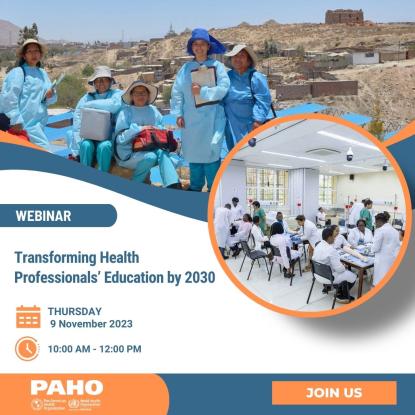
The COVID-19 pandemic had a severe impact on the availability, distribution, and quality of human resources for health (HRH) and exacerbated existing health inequities between and within countries, between among levels of care, and between the public and private sectors, with low retention of personnel in rural and underserved areas and high rates of mobility and migration. In addition, the pandemic highlighted the chronic shortage and poor distribution of HRH in the Region, as well as the lack of sufficient investment in the production, training, and professional development of a fit-for-purpose health workforce in many countries.
Diverse policies and strategies approved by the Member States of the Pan American Health Organization (PAHO) address the need to strengthen the health workforce through education, research, and other investments. The new PAHO Policy on The Health Workforce 2030: Strengthening Human Resources for Health to Achieve Resilient Health Systems (CE 172/14) and its strategic lines of action emphasize the importance of sufficient and sustained investment in education, including continuing education strategies and plans and competency-based education, as well as the organization of interprofessional teams at the first level of care, as part of the joint efforts to strengthen the Region’s health workforce to build human capital, boost health systems resilience, increase access to health services and promote regional integration.
In this context, it is important to take stock of the changes that have occurred recently in the education of health professionals and to address the need for expanding the education process as well as the challenges it entails. The education of the health workforce has continued to evolve before, during and after the COVID-19 pandemic, and thus, it’s necessary to identify current trends leading its transformation. The pandemic highlighted the need to improve health workers' education by broadening its contents and using innovative health information technologies. There is a window of opportunity to promote timely discussions and joint solutions that re-examine and potentially redesign health professionals’ education in the Region.
To address relevant issues in the education of health professionals through the discussions and exchange of experiences and perspectives from national authorities and high-level international experts in the field of human resources for health and education; in the context of the recently approved Policy on Health Workforce 2030 that PAHO/WHO will present during this event.
Challenges and opportunities to transform the education of health professionals.
Presentation on the PAHO Policy Document “Health Workforce 2030: Strengthening Human Resources for Health to Achieve Resilient Health Systems”.
Research and experience, what are the current trends and opportunities in the transformation of education for health professionals in the global and/or regional context?
- Rhonda Sealey-Thomas, Assistant Director of PAHO/WHO.
- E. Benjamin Puertas, Chief of the Human Resources for Health Unit, PAHO/WHO.
- Isabel Cardoso, Secretary, Labour and Education Management for Health, Ministry of Health, Brazil.
- Leslie Ramsammy, Advisor, Minister of Health, Guyana.
- Gloriana Mora, Unit Chief for Human Resources for Health, Ministry of Health, Costa Rica.
- Silvia Cassiani, Regional Advisor, Nursing and Allied Health Personnel Development, PAHO/WHO.
- Wendy Sealy. Lecturer in Nursing Programme Coordinator, Master of Science in Nursing Faculty of Medical Sciences the University of the West Indies.
- Marcos Nuñez, President, Pan American Federation of Associations of Medical Schools (PAFAMS).
- Laura Magaña, President & CEO. Association of Schools and Programs of Public Health (ASPPH).
